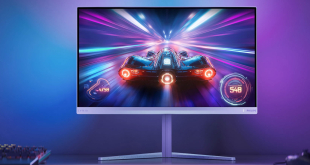
Test System Specifications:
AMD Test Bench
- CPU: AMD Ryzen 9 7950X
- Motherboard: Gigabyte X670 Aorus Elite AX
- Memory: 32GB Kingston Fury FK560C36BBEAK2-32 DDR5-6000
- Graphics card: Gigabyte RX 6700 XT Gaming OC
- Storage: 500GB Corsair MP600 PCIe Gen4 NVME M.2 SSD
- Power Supply: Seasonic Prime TX-1000
- Chassis: Open Test Bench
- Thermal Compound: Arctic MX-6
- O/S: Windows 11 Version 22H2
Intel Test Bench
- CPU: Intel Core i9-13900K
- Motherboard: Gigabyte Z790 Aorus Master
- Memory: 32GB (2 X 16GB Modules) Kingston Fury DDR5-6000
- Graphics card: Gigabyte RX 6700 XT Gaming OC
- Storage: 500GB Crucial P3 NVMe M.2 SSD
- Power Supply: Seasonic Prime TX-1000
- Chassis: Open Test Bench
- Thermal Compound: Arctic MX-6
- Operating System: Windows 11 Version 22H2
Testing Methodology:
We are primarily focussing on the performance of each cooler at 100% fan speed and also when locked to 40dBA noise output. We will focus on cooling performance using a manual overclock with all-core frequency and VCORE locked to 5.2GHz/1.3v and Precision Boost Overdrive performance.
- The test data is logged using HWINFO and the final 10 minutes of the data is calculated to find the average CPU temperature and CPU clock multiplier (PBO Test) and then plotted in the charts.
- For testing, we use a 30-minute looped run of Cinebench R23 and record the steady-state CPU temperature at the end of the test. This ensures that the CPU has had ample time to warm up and reach a steady state under all of the coolers.
- The ambient is maintained at 19-21 degrees Celsius. Where there is variation beyond this temperature range, we add extra repeated tests to ensure consistency. However, this is well controlled now with A/C.
- We also test each cooler with at least two fresh installs (typically three) to mitigate the likelihood of poor mounting spoiling results.
- Ambient temperature and humidity are controlled via a mini split air conditioning system inside the test room. Ambient temperature is maintained between 19-21C, Temperature delta figures are shown in the charts (ambient temperature is deducted from the measured component temperature).
Test Results:
Thermal Performance
AMD Ryzen 9 7950X:
In the first of three tests on the AMD Ryzen 9 7950X test bench we look at the thermal performance with the CPU frequency/voltages fixed and the radiator fans, pump speed and VRM fan speed all fixed at maximum RPM to measure the cooler's raw performance.
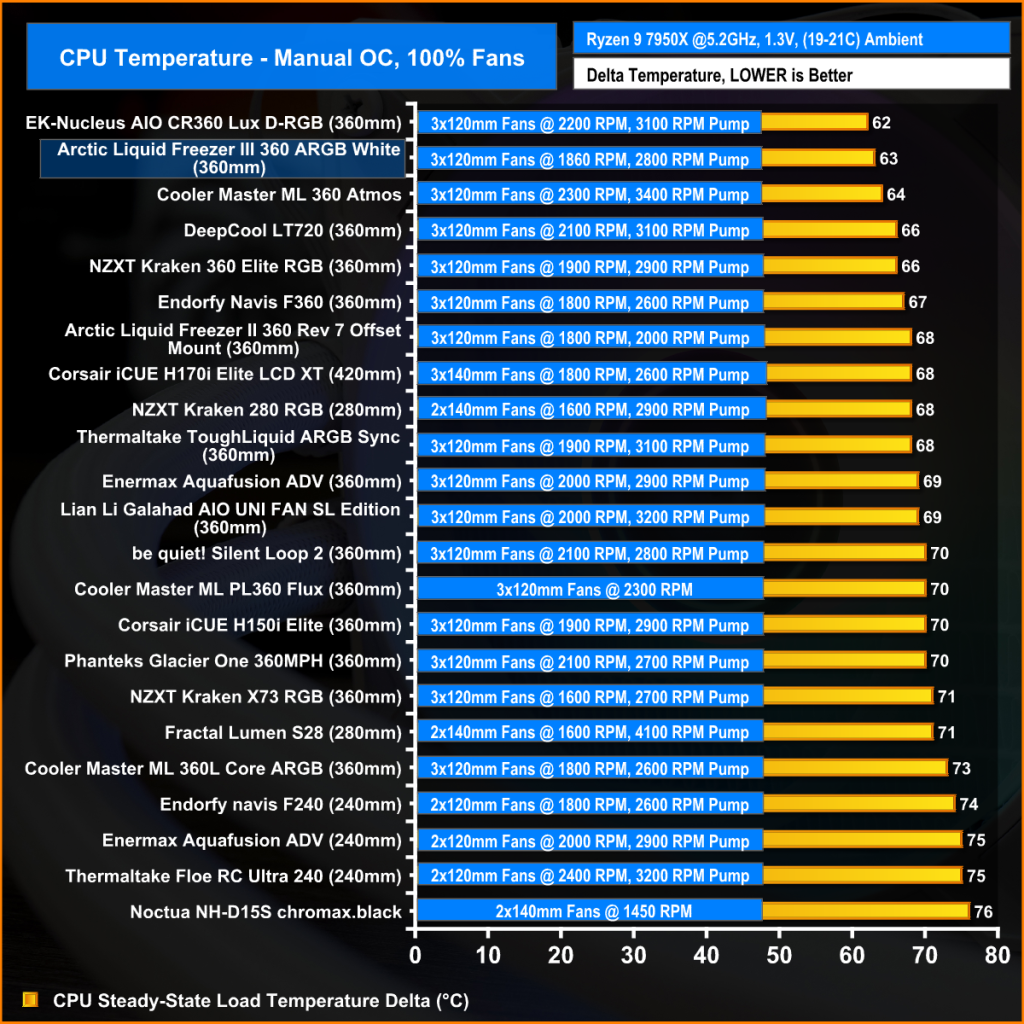
The Liquid Freezer III 360 performance in this test is superb, producing an average CPU delta temperature of 63°C and almost topping the chart. Only the more expensive EK-Nucleus can outperform the Liquid Freezer III and it uses a much higher maximum fan speed and is significantly more expensive.
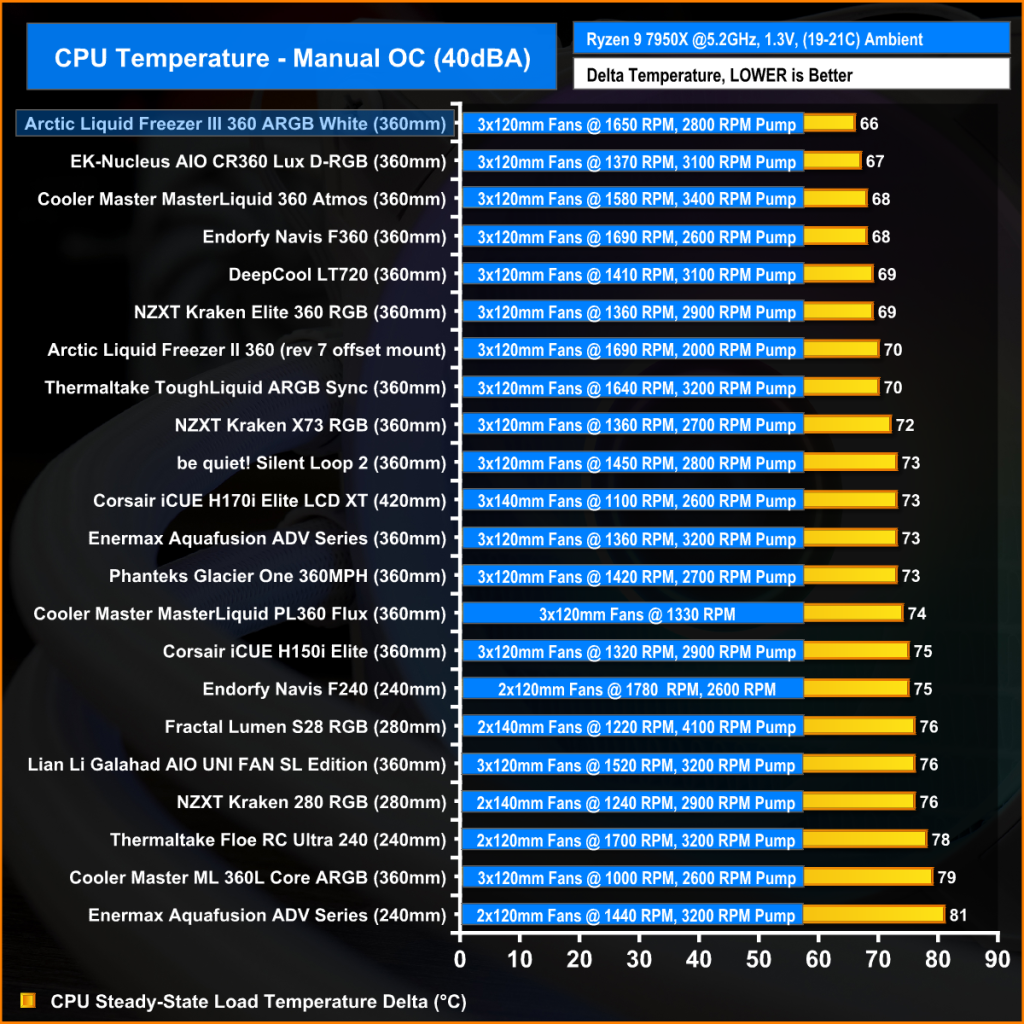
The noise output of the Liquid Freezer III at maximum fan speed is very quiet so it has an advantage over the competition when we reduce fan speed to normalise noise output. In the noise normalised test, the Liquid Freezer III again shows it has excellent performance on the AM5 platform, with an average CPU Delta of 66°C which means it tops the noise normalised chart.
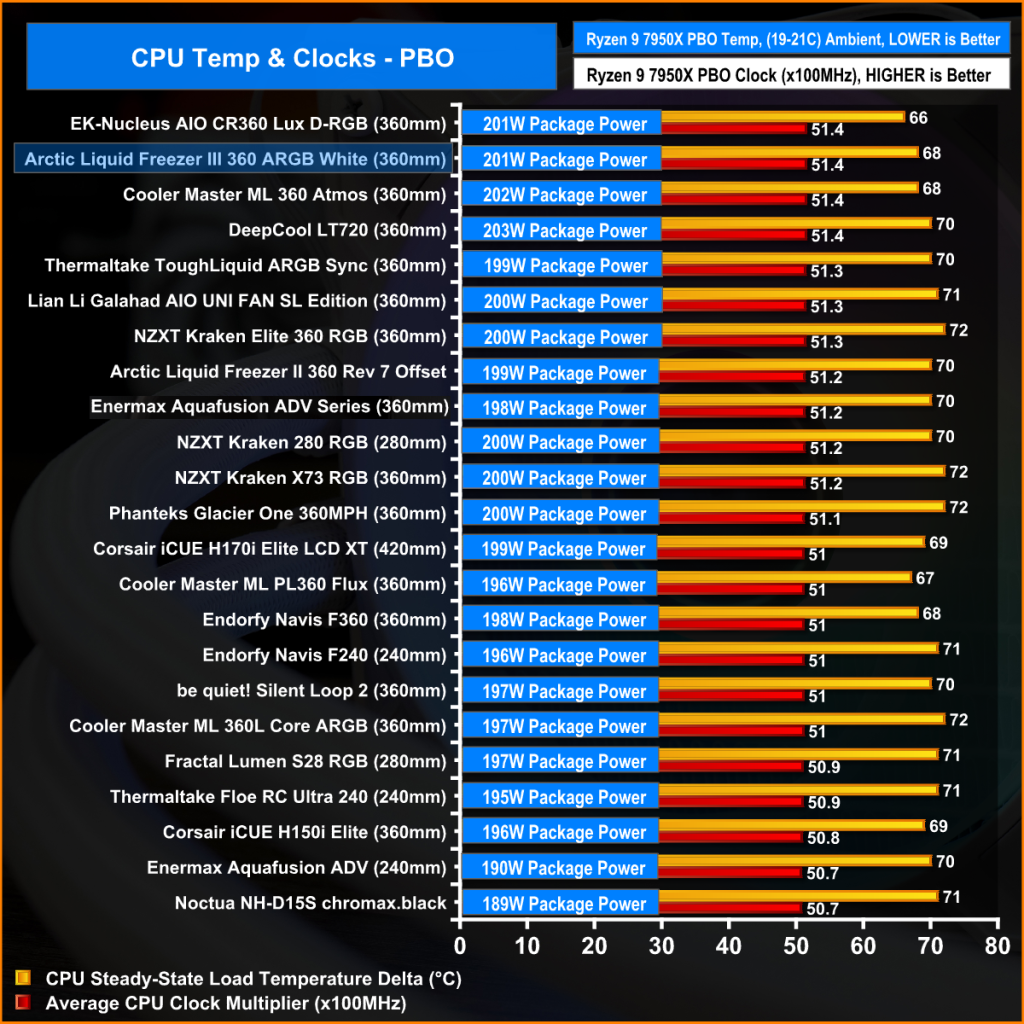
In the 7950X PBO test, again the Liquid Freezer III shows its solid performance by cooling 201W package power to an average delta of 68°C, while holding an average clock multiplier of 51.4X which is again right at the top of the charts and equalling the performance of more expensive 360mm AIO coolers. So performance in all scenarios on AMD Ryzen 9 7950X is great.
Intel Core i9-13900K:
We are still adding coolers to our Intel 13900K test bench so right now we don’t have the extensive list as we do on our AMD test system however, we can compare the performance of the Liquid Freezer III against some other 360mm AIOs including the Liquid Freezer II 360.
The Intel Core i9-13900K pulls over 100W more package power compared to the AMD Ryzen 9 7950X in our manual OC test, so it’s an even tougher test on coolers.
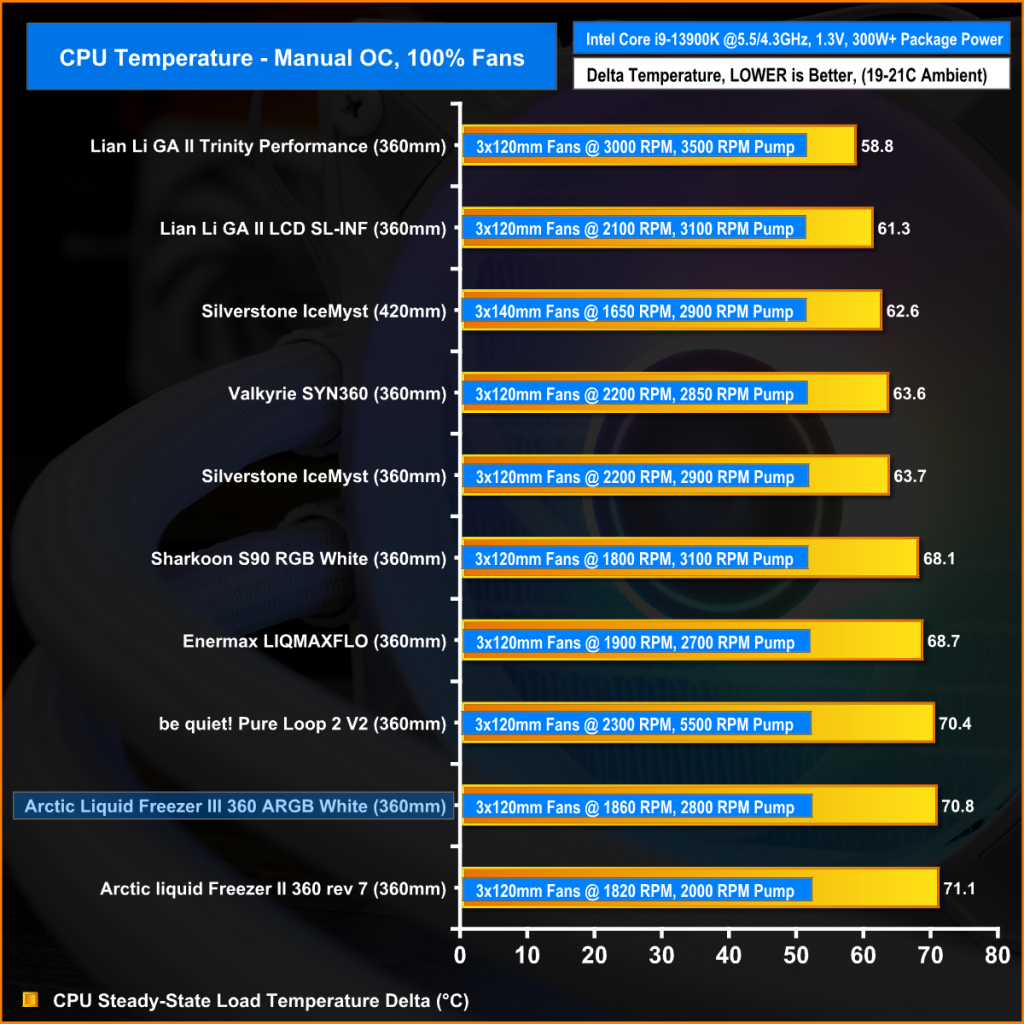
Compared with other 360mm coolers that we’ve tested on this platform previously, the Liquid Freezer III performance isn’t as impressive as it is on the AMD 7950X. The Liquid Freezer III 360 is over 10°C hotter than the top coolers in this chart and it only offers a minor improvement in thermals over the Liquid Freezer II which is quite disappointing.
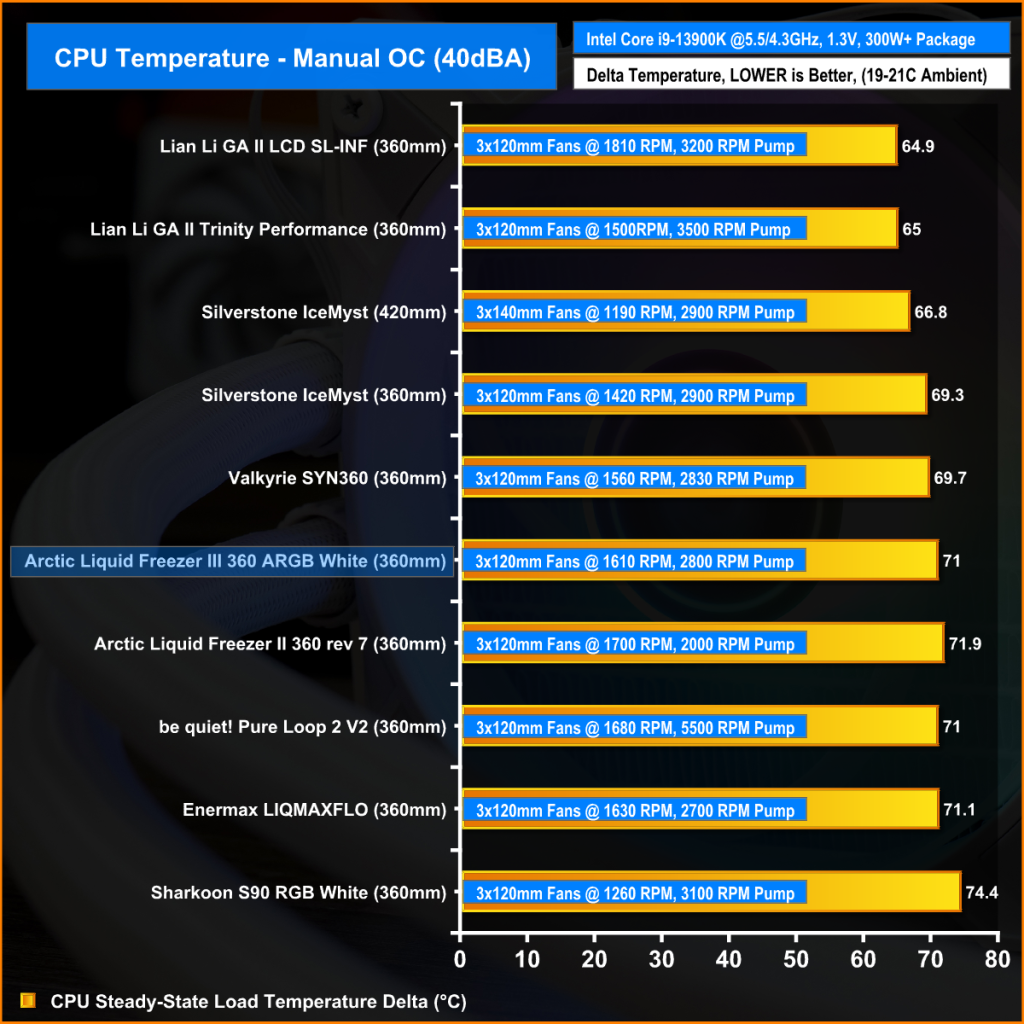
Normalising the noise output of the fans to 40dBA gives us an improvement with the Liquid Freezer III but it still lags behind the top coolers on the 13900K test system and again there's no significant improvement in thermals compared with the Liquid Freezer II.
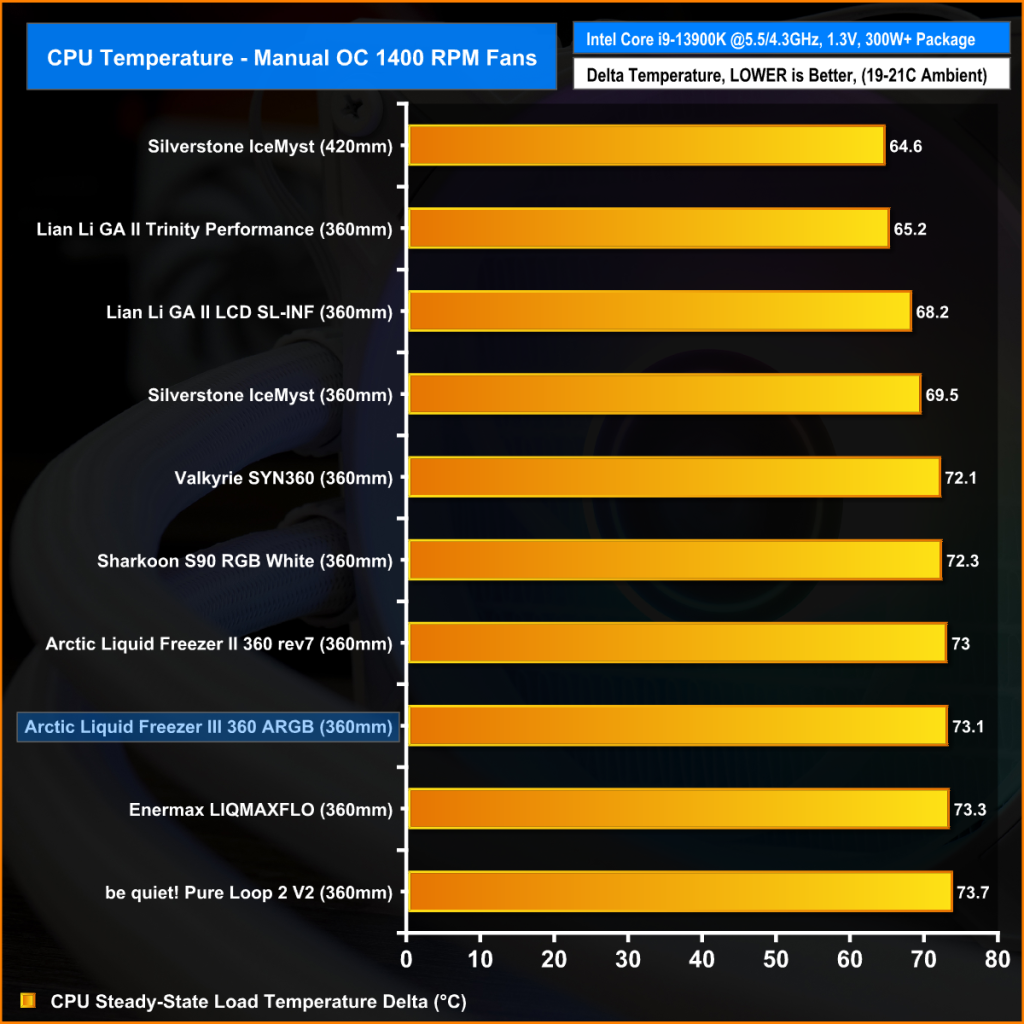
In our final test on the 13900K we fixed the fan speed to 1400 RPM on all coolers, but again the Liquid Freezer III performance isn’t as good as we hoped and there's no improvement in thermal performance versus the Liquid Freezer II 360. So either the Liquid Freezer III is more optimised for AMD CPUs or its simply overwhelmed by the 300W plus package power produced by the i9-13900K.
Acoustics
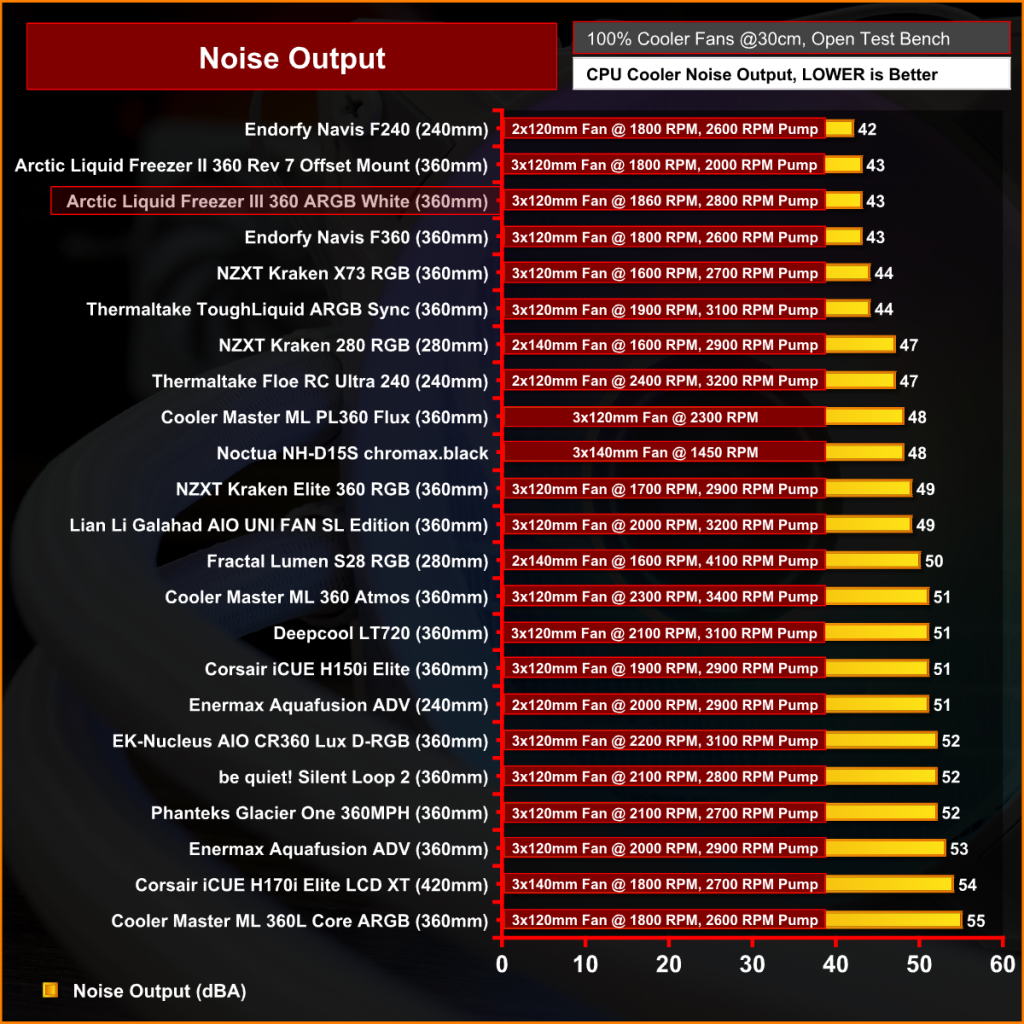
In terms of noise output the Liquid Freezer III is virtually identical at maximum fan speed as the Liquid Freezer II as it uses the same P Series fans. So the Liquid Freezer II is extremely quiet at maximum fan speed compared with most high-performance coolers, so if noise is important to you then this is a great choice. And it explains why there isn’t much of a drop in thermal performance when we normalise noise to 40dBA
 KitGuru KitGuru.net – Tech News | Hardware News | Hardware Reviews | IOS | Mobile | Gaming | Graphics Cards
KitGuru KitGuru.net – Tech News | Hardware News | Hardware Reviews | IOS | Mobile | Gaming | Graphics Cards


